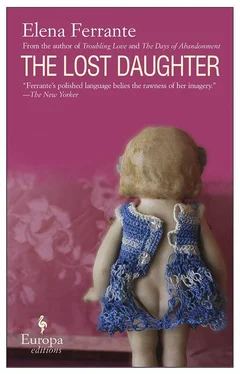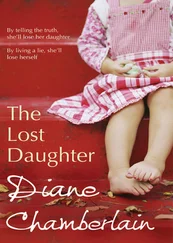Afterward I was hungry and went back to the tray of fruit. I discovered that under the beautiful show figs, pears, prunes, peaches, grapes were overripe or rotten. I took a knife and cut off large black areas, but the smell disgusted me, the taste, and I threw almost all of it in the garbage. I could go out, look for a restaurant, but I gave up on eating because I was tired, I wanted to sleep.
In the bedroom there were two large windows. I opened them and turned off the lights. Outside, every so often, I saw the beam of a lighthouse explode out of the darkness and strike the room for a few seconds. One should never arrive in an unknown place at night, everything is undefined, every object is easily exaggerated. I lay down on the bed in my bathrobe, my hair wet, and stared at the ceiling, waiting for the moment when it would become white with light. I heard the distant sound of an outboard motor and a faint song that was like a meow. I had no contours. I turned drowsily and touched something on the pillow that felt cold, something made of tissue paper.
I turned on the light. On the bright-white material of the pillowcase was an insect, three or four centimeters long, like a giant fly. It was dark brown, and motionless, with membranous wings. I said to myself: it’s a cicada, maybe its abdomen burst on my pillow. I touched it with the hem of my bathrobe, it moved and became immediately quiet. Male, female. The stomach of the females doesn’t have elastic membranes, it doesn’t sing, it’s mute. I felt disgust. The cicada punctures olive trees and makes the sap drip from the bark of the mountain ash. I cautiously picked up the pillow, went to one of the windows, and tossed the insect out. That was how my vacation began.
The next day I put in my bag bathing suit, beach towels, books, xeroxes, notebooks, got in the car, and went in search of beach and sea along the county road that followed the coast. After about twenty minutes a pinewood appeared on my right. I saw a sign for parking, and stopped. Loaded down with my things, I climbed over the guardrail and set off along a path reddened by pine needles.
I love the scent of resin: as a child, I spent summers on beaches not yet completely eaten away by the concrete of the Camorra—they began where the pinewood ended. That scent was the scent of vacation, of the summer games of childhood. The squeak or thud of a dry pinecone, the dark color of the pine nuts reminds me of my mother’s mouth: she laughs as she crushes the shells, takes out the yellow fruit, gives it to my sisters, noisy and demanding, or to me, waiting in silent expectation, or eats it herself, staining her lips with dark powder and saying, to teach me not to be so timid: go on, none for you, you’re worse than a green pinecone.
The pinewood was very thick, with a tangled undergrowth, and the trunks, which had grown up bending under the force of the wind, seemed on the point of falling over, fearful of something that came from the sea. I took care not to stumble on the shiny roots that crisscrossed the path and controlled my revulsion at the dusty lizards that left the patches of sun as I passed and fled in search of shelter. I walked for no more than five minutes, then the dunes and the sea appeared. I passed the twisted trunks of eucalyptus growing out of the sand, took a wooden walkway among green reeds and oleanders, and came to a tidy public bath house.
I liked the place immediately. I was reassured by the kindness of the dark man at the counter, by the gentle young beach attendant, who, tall and thin, unmuscular, in a T-shirt and red shorts, led me to an umbrella. The sand was white powder, I took a long swim in transparent water, and sat in the sun. Then I settled myself in the shade with my books and worked in peace until sunset, enjoying the breeze and the rapid changes of the sea. The hours slipped away in such a gentle mixture of work, daydreams, and idleness that I decided I would keep going back there.
In less than a week it had all become a peaceful routine. I liked the squeak of the pinecones opening to the sun as I cross the pinewood, the scent of small green leaves that seemed to be myrtle, the strips of bark peeling off the eucalyptus trees. On the path I imagined winter, the pinewood frozen among the fogs, the broom that produced red berries. Every day on my arrival the man at the counter greeted me with polite satisfaction; I had a coffee at the bar, a glass of water. The attendant, whose name was Gino and who was surely a student, promptly opened the umbrella and the lounge chair, and then withdrew into the shade, his full lips parted, his eyes intent as he underlined with a pencil the pages of a big volume for some exam or other.
I felt tender as I looked at that boy. Usually I dozed as I dried off in the sun, but sometimes I didn’t sleep; eyes half closed, I observed him with sympathy, taking care that he wouldn’t notice. He seemed restless, contorting his handsome, nervous body, running the fingers of one hand through his glossy black hair, worrying his chin. My daughters would have liked him, especially Marta, who fell in love easily with lean, nervous boys. As for me, who knows. I realized long ago that I’ve held onto little of myself and everything of them. Even now, I was looking at Gino through the filter of Bianca’s experiences, of Marta’s, according to the tastes and passions I imagine as theirs.
The young man was studying, but he seemed to have sensors independent of sight. If I merely made a move to shift the lounge chair from the sun to the shade, he would jump up, ask if I needed help. I smiled, shook my head no, what did it take to move a lounge chair. It was enough to feel myself protected, without deadlines to keep in mind, nothing urgent to confront. No one depended anymore on my care and, finally, even I was no longer a burden to myself.
The young mother and her daughter I became aware of later. I don’t know if they had been there since my first day on the beach or appeared afterward. In the three or four days following my arrival I hardly noticed a rather loud group of Neapolitans, children, adults, a man in his sixties with a mean expression, four or five children who fought fiercely in the water and on land, a large woman with short legs and heavy breasts, nearly forty, perhaps, who went back and forth between the beach and the bar, painfully dragging a pregnant belly, the great, naked arc stretched between the two halves of her bathing suit. They were all related, parents, grandparents, children, grandchildren, cousins, in-laws, and their laughter rang out noisily. They called each other by name with drawn-out cries, hurled exclamatory or conspiratorial comments, at times quarreled: a large family group, similar to the one I had been part of when I was a girl, the same jokes, the same sentimentality, the same rages.
One day I looked up from my book and, for the first time, saw the young woman and the little girl. They were returning from the water’s edge to their umbrella, she no more than twenty, her head bent, and the child, three or four years old, gazing up at her, rapt, holding a doll the way a mother carries a child in her arms. They were talking to each other peacefully, as if they alone existed. From the umbrella, the pregnant woman called out irritatedly in their direction, and a fat gray-haired woman in her fifties, fully dressed, who was perhaps the mother, made gestures of discontent, disapproving of I don’t know what. But the girl seemed deaf and blind, she went on talking to the child and walking up from the sea with measured steps, leaving on the sand the dark shadow of her footprints.
They, too, were part of the big noisy family, but she, the young mother, seen this way, from a distance, with her slim body, the tastefully chosen one-piece bathing suit, the slender neck, the shapely head and long, wavy, glossy black hair, the Indian face with its high cheekbones, the heavy eyebrows and slanting eyes, seemed to me an anomaly in the group, an organism that had mysteriously escaped the rule, the victim, now assimilated, of a kidnapping or of an exchange in the cradle.
Читать дальше












